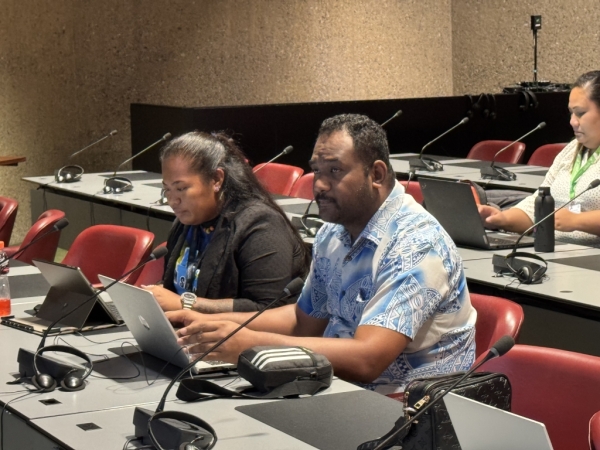
30 April 2025, Geneva, Switzerland – Surveys in the Pacific have shown an urgent need for Pacific island countries to address the problem of Persistent Organic Pollutants (POPs) pollution. This is a problem that Fiji, as a party to the Stockholm Convention on Persistent Organic Pollutants, believes can be addressed under the Convention, and achieved if all Pacific island countries work together.
Mr. Jimmy Gaunavou of the Ministry of the Environment and Climate Change is representing Fiji at the the two-week Triple Conferences of the Parties to the Basel, Rotterdam, and Stockholm Conventions being held in Geneva, Switzerland.
“Fiji has been a Party to the Stockholm Convention since 2001, and we believe in the significance of the Convention especially with relation to the management and regulation of POPs, which is a major concern not only for Fiji but for other Pacific island countries as well,” says Gaunavou.|
Persistent Organic Pollutants (POPs) are organic chemical substances that, once released into the environment, remain intact for long periods of time, become widely distributed throughout the environment as a result of natural processes, and accumulate in living organisms including humans. POPs are extremely toxic to both humans and wildlife.
POPs are now widely distributed and can be found around the globe, partly due to the fact that once they are absorbed by fish, birds, and mammals, they travel where these living organisms travel. As a result, POPs can now be found in remote areas that have no inherent sources of POPs.
The negative impacts of POPs on human health can lead to cancer, allergies, damage to the nervous systems, reproductive disorders, and disruption of the immune systems. POPs can also reach the environment through agricultural and urban run-off, drainage systems, and landfill leachate. Once POPs are in the environment, they can cause a myriad of issues including soil, water, and air deterioration.
The Stockholm Convention on Persistent Organic Pollutants is a global treaty to protect human health and the environment from POPs and their harmful impacts. To date, 185 countries have ratified the Convention, and various pesticides, industrial chemicals and by-products have been listed in its Annexes as POPs. Parties to the Stockholm Convention commit to not produce or use these listed chemicals.

Mr. Gaunavou stated that Fiji’s representation at the 12th Conference of the Parties to the Stockholm Convention in Geneva will further bolster Fiji’s efforts to address POPs, given that the listed chemicals are updated every two years when a Conference of the Parties is held.
But Fiji cannot do it alone, he says.
“We cannot work in isolation. We need the support of our neighbouring countries in the region,” Mr. Gaunavou says.
“Other Pacific island countries have their own national priorities which are no different to Fiji’s given that we are all connected by our Pacific ocean. Fiji is here to support our regional efforts and add strength to our collective voice as Pacific Small Island Developing States,” he added.
“In order to address the impacts of POPs, we need to address it together. By working together, we can effectively manage POPs pollution not only nationally, but also across our Pacific region,” he concluded.
Mr. Anthony Talouli, Director of the Waste Management and Pollution Control Programme of the Secretariat of the Pacific Regional Environment PRogramme added that the Stockholm Convention is important for Pacific island countries as SIDS with special circumstances.
“As SIDS with special circumstances, we rely on the Stockholm Convention to protect us,” Mr. Talouli says.
“With the Convention, we do not have to pay the price, bear the burden, or be put at risk due to the continued use of POPs, as there are viable alternatives to these listed chemicals,” he concluded.
The 17th Conference of the Parties to the Basel Convention, 12th Conference of the Parties to the Rotterdam Convention, and the 12th Conference of the Parties to the Stockholm Convention is being held from 28 April – 9 May 2025 in Geneva, Switzerland.
The Basel Convention on the Transboundary Movement of Hazardous Wastes and their Disposal aims to reduce the generation of hazardous waste and promote environmentally-sound management of hazardous waste, restrict the transboundary movements of hazardous waste and put in place a regulatory system applicable to cases where transboundary movements are permissible.
The Rotterdam Convention on the Prior, Informed Consent Procedure for Hazardous Chemicals and Pesticides in International Trade aims to promote shared responsibility and collaborative effort among Parties in the international trade of certain hazardous chemicals in order to protect human health and the environment from potential harm.
The Stockholm Convention on Persistent Organic Pollutants (POPs) is a global treaty to protect from chemicals that remain intact in the environment for long periods of time and accumulate in the fatty tissues of human and wildlife, resulting in harmful impacts on human health and the environment.
The representatives from the Pacific include Cook Islands, the Federated States of Micronesia, Fiji, Kiribati, Palau, the Republic of the Marshall Islands, Tonga, Tuvalu, and Vanuatu.